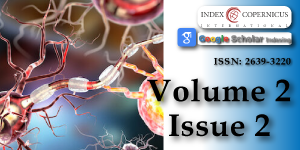Herpes simplex virus (HSV)-1 encephalitis can induce chronic anti-N-methyl-D-aspartate receptor (NMDAR) encephalitis
Main Article Content
Abstract
Herpes simplex virus (HSV)-1 encephalitis is the most common infectious cause of sporadic encephalitis. Despite treatment with acyclovir, HSV encephalitis is still associated with severe morbidity characterized by persistent neurological deficits. HSV encephalitis usually follows a monophasic course, however, some patients might develop relapsing symptoms caused by the formation of auto-antibodies directed against the N-methyl-D-aspartate receptor (NMDAR). Here we present an 82-year-old male patient with HSV encephalitis who developed shortly after his hospital discharge a Post-HSV NMDAR encephalitis, characterized by recurrent epileptic seizures and deterioration of his residual aphasia. First-line immunotherapy with intravenous immunoglobulins (IgIV) was administered and the patient returned almost to his baseline residual deficits of HSV encephalitis. Subsequently, he presented with recurrent relapses of NMDAR encephalitis. Since periodic treatment with IgIV has been started the patient is seizure-free and his neuropsychiatric condition is stable. In conclusion, the recognition of Post-HSV NMDAR encephalitis is very important because neurological manifestations can markedly improve with immunotherapy. Interestingly, in some patients cerebral HSV infection seems to trigger a chronic inflammatory disorder with persistent autoimmune activation which requires chronic treatment.
Article Details
Copyright (c) 2018 Buechner S, et al.

This work is licensed under a Creative Commons Attribution 4.0 International License.
Bradshaw MJ, Venkatesan A. Herpes Simplex Virus-1 Encephalitis in Adults: Pathophysiology, Diagnosis, and Management. Neurotherapeutics. 2016; 13: 493-508. Ref.: https://tinyurl.com/y896nyme
Nosadini M, Mohammad SS, Corazza F, Ruga EM, Kavitha Kothur, et al. Herpes simplex virus-induced anti-N-methyl-D-aspartate receptor encephalitis: a systemic literature review with analysis of 43 cases. Developmental Medicine & Child Neurology. 2017; 59: 796-805. Ref.: https://tinyurl.com/y9qoyq2r
Armangue T, Moris G, Cantarin-Extremera V, Conde CE, Rostasy K, et at. Autoimmune post-herpes simplex encephalitis of adults and teenagers. Neurology. 2015; 85: 1736-1743. Ref.: https://tinyurl.com/y9r6hdfs
Westman G, Studahl M, Ahlm C, Eriksson BM, Persson B, et al. N-methyl-D-aspartate receptor autoimmunity affects cognitive performance in herpes simplex encephalitis. Clin Microbiol Infect. 2016; 22: 934-940. Ref.: https://tinyurl.com/yd8m4na3
Kovac S, Alferink J, Ahmetspahic D, Arolt V, Melzer N. Update Anti-N-Methyl-D-Aspartat-Rezeptor-Enzephalitis. Nervenarzt. 2018; 89: 99-112. Ref.: https://tinyurl.com/y9np7ye4
Bien CG, Bauer J. Autoimmune Epilepsies. Neurotherapeutics. 2014; 11: 311-318. Ref.: https://tinyurl.com/y7hgfc2e
Schein F, Gagneux-Brunon A, Antoine JC, Lavernhe S, Pillet S, et al. Anti-N-methyl-D-aspartate receptor encephalitis after Herpes simplex virus-associated encephalitis: an emerging disease with diagnosis and therapeutic challenges. Infection. 2017; 45: 545-549. Ref.: https://tinyurl.com/ycjcvyrd
Linnoila JJ, Binnicker MJ, Majed M, Klein CJ, McKeon A. CSF herpes virus and autoantibody profiles in the evaluation of encephalitis. Neurol Neuroimmunol Neuroinflamm. 2016; 3: e245. Ref.: https://tinyurl.com/y8l4mlsb
Popkirov S, Ismail FS, Grönheit W, Kapauer M, Wellmer J, et al. Progressive hippocampal sclerosis after viral encephalitis: Potential role of NMDA receptor antibodies. Seizure. 2017; 51: 6-8. Ref.: https://tinyurl.com/y83qkcmo
Omae T, Saito Y, Tsuchie H, Ohno K, Maegaki Y, et al. Cytokine/chemokine elevation during the transition phase from HSV encephalitis to autoimmune anti-NMDA receptor encephalitis. Brain Dev. 2018; 40: 361-365. Ref.: https://tinyurl.com/yaqahfqb





